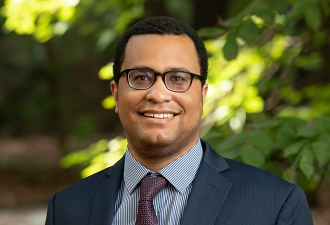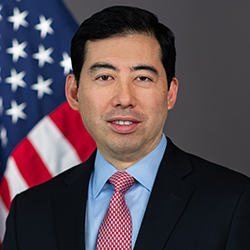Corporate and Financial Law
The Duke Law faculty possess unrivalled expertise as scholars and practitioners in all areas of business, financial, and transactional law and regulation, both domestic and international.
Their expertise has resulted in a curriculum of exceptional breadth and depth in these areas, cementing Duke’s reputation as one of the very best law schools to learn how represent, advise, lead, and even regulate businesses of all sizes. And as a result, the tightly knit network of Duke Law graduates can be found in those roles across the nation and around the world.
At Duke Law, students can dive deeply into matters of corporate formation, structure, acquisition, and reorganization, and learn the nuances of corporate finance whether it be through the capital markets or private equity and hedge funds. They also can gain critical practical expertise in representing early-stage corporate and nonprofit clients and managing transactions through the Start-Up Ventures Clinic, the Community Enterprise Clinic, and the Law & Entrepreneurship Program.

Gina Gail S. Fletcher
Professor of Law
Before becoming a professor, Gina-Gail S. Fletcher practiced law at Gibson, Dunn & Crutcher in Washington, D.C., where she specialized in securities regulation, mergers and acquisitions, banking, and corporate governance and helped draft parts of the 2010 Dodd-Frank Act. Her research examines how market innovations can be misused to manipulate the markets and the implications of such practices on the stability of the financial markets. In 2021, she testified before Congress about the rise of “meme stocks.”
More Faculty
203 Business Strategy for Lawyers
This course presents the fundamentals of business strategy to a legal audience. The course is designed to introduce a wide variety of modern strategy frameworks and methodologies, including methods for assessing the strength of competition, for understanding relative bargaining power, for anticipating competitors' actions, for analyzing cost and value structures, and for assessing the potential for firm growth through innovation. Although the case studies will span a variety of different industries, there will be an emphasis on high technology firms. The ideas in this course have relevance to anyone seeking to manage a law firm, advise business clients, engage in entrepreneurship, or lead a large company.
215 Commercial Transactions
A study of basic policy choices made in the structuring of the law governing consumer and commercial transactions. The course serves as an overview of the role of debt in U.S. society, especially consumer debt. This course looks at common debt arrangements, bankruptcy, and secured lending, both for personal property and for real property (mortgages). Particular attention is given to the lessons learned, and not learned, in the mortgage crisis. The course weaves discussions of major policy issues on excessive consumer and student debt with the substantive rules that define how debt arrangements are structured and then resolved, as in bankruptcy.
325 Corporate Finance
This course is designed to familiarize law students with the principles of corporate finance. In the world of corporate finance, the distinction between lawyers and investment bankers has blurred. Whether negotiating a merger agreement, acquisition, or divestiture, rendering a fairness opinion, preparing for an appraisal hearing, litigating securities class action or derivative suits, issuing new securities, taking a firm private via an LBO or public via an IPO, corporate lawyers and investment bankers work side-by-side. Lawyers with an appreciation of the basics of corporate finance gain a distinct advantage. This course will also provide important tools for litigators to work with financial expert witnesses and calculate damages.
384 Securities Regulation
A study of the federal and state securities laws and the industry they govern with emphasis on the regulation of the distribution process and trading in securities; subjects dealt with include the functions of the Securities and Exchange Commission, registration and disclosure requirements and related civil liabilities, "blue-sky" laws, proxy solicitation and reporting requirements, broker-dealer regulation, the self-regulatory functions of the exchanges, and the regulation of investment companies.
710 Derivatives: Financial Markets, Law and Policy
Modern capital and financial markets rely on a wide variety of complex instruments, including Treasury securities, structured debt and equity instruments, and derivatives of various kinds. Public awareness regarding these instruments has grown since the financial crisis of 2008 because they are thought to have played an important role in both the rapid growth of financial markets (“financialization”) and their destabilization. Yet these instruments and the role they play in modern markets remain little understood. A basic understanding of these instruments has now become important in modern financial law practice and any discussions on financial policy and regulation.
This course will review the workings of derivative instruments in the capital markets and how such instruments themselves are used. The relationship between banking and capital markets, and between government and the private markets, will be explored, as will the most important legal and fiduciary responsibilities involved. While not highly technical, the various principal types of government securities and derivatives will be examined.
203 Business Strategy for Lawyers
This course presents the fundamentals of business strategy to a legal audience. The course is designed to introduce a wide variety of modern strategy frameworks and methodologies, including methods for assessing the strength of competition, for understanding relative bargaining power, for anticipating competitors' actions, for analyzing cost and value structures, and for assessing the potential for firm growth through innovation. Although the case studies will span a variety of different industries, there will be an emphasis on high technology firms. The ideas in this course have relevance to anyone seeking to manage a law firm, advise business clients, engage in entrepreneurship, or lead a large company.
215 Commercial Transactions
A study of basic policy choices made in the structuring of the law governing consumer and commercial transactions. The course serves as an overview of the role of debt in U.S. society, especially consumer debt. This course looks at common debt arrangements, bankruptcy, and secured lending, both for personal property and for real property (mortgages). Particular attention is given to the lessons learned, and not learned, in the mortgage crisis. The course weaves discussions of major policy issues on excessive consumer and student debt with the substantive rules that define how debt arrangements are structured and then resolved, as in bankruptcy.
325 Corporate Finance
This course is designed to familiarize law students with the principles of corporate finance. In the world of corporate finance, the distinction between lawyers and investment bankers has blurred. Whether negotiating a merger agreement, acquisition, or divestiture, rendering a fairness opinion, preparing for an appraisal hearing, litigating securities class action or derivative suits, issuing new securities, taking a firm private via an LBO or public via an IPO, corporate lawyers and investment bankers work side-by-side. Lawyers with an appreciation of the basics of corporate finance gain a distinct advantage. This course will also provide important tools for litigators to work with financial expert witnesses and calculate damages.
384 Securities Regulation
A study of the federal and state securities laws and the industry they govern with emphasis on the regulation of the distribution process and trading in securities; subjects dealt with include the functions of the Securities and Exchange Commission, registration and disclosure requirements and related civil liabilities, "blue-sky" laws, proxy solicitation and reporting requirements, broker-dealer regulation, the self-regulatory functions of the exchanges, and the regulation of investment companies.
710 Derivatives: Financial Markets, Law and Policy
Modern capital and financial markets rely on a wide variety of complex instruments, including Treasury securities, structured debt and equity instruments, and derivatives of various kinds. Public awareness regarding these instruments has grown since the financial crisis of 2008 because they are thought to have played an important role in both the rapid growth of financial markets (“financialization”) and their destabilization. Yet these instruments and the role they play in modern markets remain little understood. A basic understanding of these instruments has now become important in modern financial law practice and any discussions on financial policy and regulation.
This course will review the workings of derivative instruments in the capital markets and how such instruments themselves are used. The relationship between banking and capital markets, and between government and the private markets, will be explored, as will the most important legal and fiduciary responsibilities involved. While not highly technical, the various principal types of government securities and derivatives will be examined.
Start-Up Ventures Clinic
The Start-Up Ventures Clinic provides legal advice and assistance to entrepreneurs and to seed- and early-stage ventures that have not yet raised significant amounts of outside capital in a wide variety of legal matters, including company formation, intellectual property protection, commercialization strategies, and operational issues. Student-attorneys work with actual clients from the thriving entrepreneurial ecosystem on Duke's campus and in the broader community.

Community Enterprise Clinic
The Community Enterprise Clinic helps nonprofit organizations and social entrepreneurs plan and implement community development projects that improve the quality of life in economically disadvantaged areas. The clinic gives students the opportunity to develop business law skills and expertise as they help organizations that would otherwise not have access to a lawyer overcome barriers, attract resources, and improve the quality of life in the communities they serve.


Danielle was active in a variety of student activities as a student, including the Business Law Society, where as co-president she was responsible for organizing ESQ, an annual event enabling students to learn from and connect with leading corporate lawyers from Duke Law's alumni network. Her interest in corporate law and entrepreneurship led her to enroll in the Start-up Ventures Clinic, where she later served as a teaching assistant. She was also external vice president of the Black Law Students Association and a Duke Law Journal staff editor. After working as a corporate associate in the Palo Alto, Calif., office of Simpson Thacher & Bartlett, Danielle is now Head of Legal at Loom, a venture-backed interactive video messaging company.


























